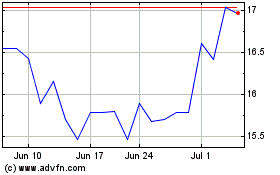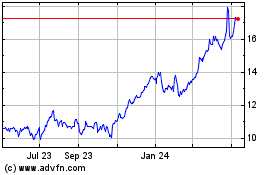By Rob Copeland and Jenny Strasburg
Some Deutsche Bank AG clients, among them several big and
influential hedge funds, have moved to pull billions of dollars
from the bank amid concerns about its stability and their exposure,
said people close to clients and the bank.
The funds have taken steps to withdraw securities or cash from
the bank, dial back their trading activities or both, the people
said. They include AQR Capital Management LLC, Capula Investment
Management LLP, Citadel LLC, Luxor Capital Group LP, Magnetar
Capital LLC and Millennium Management LLC.
The amount of assets recently withdrawn or earmarked for
potential withdrawal is in the billions of dollars, one of the
people said. That is a small piece of the hundreds of billions in
balances analysts say Deutsche Bank has in its so-called
prime-brokerage business alone -- and a tiny fraction of its more
than $600 billion in customer deposits overall.
Still, the retreat by clients is a sign of nervousness about
Deutsche Bank's ability to weather its challenges, some of which
are specific to the bank and others wrought by economic conditions
plaguing European banks as a group.
The client moves, which have mounted in recent days, don't mean
the hedge funds have stopped doing business with Deutsche Bank, but
that they have taken steps to transfer some of their accounts,
financing arrangements and trading to other banks as questions
about Deutsche Bank's capital position have intensified, the people
said.
Bloomberg News reported earlier Thursday that some Deutsche Bank
clients have moved derivatives holdings to other firms this week,
citing an internal bank document. That report sent the U.S.-traded
shares of Deutsche Bank tumbling more than 6%.
"Our trading clients are amongst the world's most sophisticated
investors," Deutsche Bank said in a statement. "We are confident
that the vast majority of them have a full understanding of our
stable financial position, the current macroeconomic environment,
the litigation process in the U.S. and the progress we are making
with our strategy."
Beyond hedge funds, executives and salespeople also have tried
to ease the concerns of investment-bank and wealth-management
clients, people involved in discussions with the bank said.
John Cryan, the lender's chief executive, was in New York this
week, and met with clients amid a swirl of negative news about the
bank.
Besides emphasizing Deutsche Bank's creditworthiness and
liquidity, executives and client-relationship managers this week
told wealth-management clients, for example, that the bank's
operations aren't affected by fluctuations in its stock price, the
people said.
Several hedge-fund managers said their hands were being forced
by their own investors' drilling them about whether some of their
holdings could get caught up at Deutsche Bank should the firm run
into deep trouble.
Many said they were reminded of the 2008 financial crisis, when
big hedge funds pulled accounts from prime brokers at firms like
Bear Stearns, helping precipitate their decline. "That is at the
back of everyone's minds," said one hedge-fund manager whose firm
has dialed back its exposure to Deutsche Bank recently.
Deutsche Bank has repeatedly said those concerns aren't
justified. Banking analysts say that liquidity -- the availability
of ample, easy-to-sell securities and other funding to satisfy
client obligations -- isn't a pressing problem: Deutsche Bank has
more than EUR220 billion (about $246.8 billion) of liquidity
reserves.
It also has a formidable backstop in the European Central Bank,
which provides huge quantities of liquidity on permissive terms.
Through an emergency program orchestrated by the ECB, national
central banks in the eurozone can lend yet more -- the Bank of
Greece provided around EUR90 billion of emergency liquidity to
Greek banks in crisis last year.
But the lack of a convincingly profitable strategy and waning
shareholder confidence in the bank are big problems, analysts and
investors say. Poor financial results and costly potential fines
eat into the bank's capital cushion, which is already thinner than
many of its peers. Fears that the bank might be forced to raise
capital, hurting existing shareholders by diluting their stakes,
have weighed on shares. The decline in share price, in turn, makes
it more difficult to raise fresh capital.
Deutsche Bank's situation has been complicated by thorny
politics at home. German Chancellor Angela Merkel and other
government officials have faced relentless questions about their
appetite for bailing out Deutsche Bank, should it need a
rescue.
Ms. Merkel has for years taken a hard-line stance criticizing
taxpayer bailouts of European banks, pressing southern European
countries to impose losses on bondholders before taxpayer-financed
rescues come into play. Postcrisis European rules, many written at
Germany's instigation, make it hard for countries to sail to the
rescue of a hometown bank.
Mr. Cryan this week said the bank has neither asked for nor
needs a government bailout. A spokesman for Ms. Merkel said there
was "no need for such speculation" about state aid for Deutsche
Bank, responding to a German magazine report that Ms. Merkel had
ruled out providing the bank with government assistance.
Deutsche Bank has been under pressure all year, the epicenter of
continentwide worries about European banks' performance and
resilience in the face of a weak economy, low interest rates and
flagging business.
The concerns picked up two weeks ago when The Wall Street
Journal reported that the U.S. Justice Department floated the idea
of Deutsche Bank paying $14 billion to settle a series of
high-profile mortgage-securities cases. The bank responded by
saying it had no intention to pay "anywhere near" that amount, and
said its negotiations with the Justice Department were just
starting.
The disclosure sparked fears that Deutsche Bank might have to
mount a painful capital hike. Bank executives have repeated to
investors, clients and employees -- and publicly -- that the lender
has adequate capital and has no plans to sell shares.
Write to Rob Copeland at rob.copeland@wsj.com and Jenny
Strasburg at jenny.strasburg@wsj.com
(END) Dow Jones Newswires
September 29, 2016 20:21 ET (00:21 GMT)
Copyright (c) 2016 Dow Jones & Company, Inc.
Deutsche Bank Aktiengese... (NYSE:DB)
Historical Stock Chart
From Mar 2024 to Apr 2024

Deutsche Bank Aktiengese... (NYSE:DB)
Historical Stock Chart
From Apr 2023 to Apr 2024
